
SAKATA UK has a history of introducing innovative & tasty products to the UK vegetable industry. For 2004 Sakata will continue to test and introduce a wide range of exciting new products.
Stuart Cox, technical manager of Sakata UK, highlights a range of promising products entering the market from the company.
“Broccoli remains the number one product for Sakata globally, and with increasing global consumption and greater product diversification, we are introducing several new varieties. Olympia F1 is a new wide adaptability variety suitable for full season production in the UK, heads are deep heavy with concentrated maturity and good plant vigour.
“Green Magic F1 is a new early season variety aimed at first spring plantings for June harvest. The heads are very smooth with excellent bead and stem colour. It will be widely tested by growers in 2004.
“Cauliflower is another key crop and this year sees the first true summer variety introduction in the form of the new coded variety CF00034 F1. This UK bred variety has widely impressed in previous seasons trials and particularly last season when heat and drought tolerance were tested to the limit. It will become commercially available this spring.
“Colour sells, and to complement the unique purple Cauliflower variety Graffiti F1, a new orange curded variety CA750 F1 is being tested with growers. This new variety can be used to produce real orange curds from mid-June through to mid-October, even during warm night periods, which in previous orange varieties resulted in more of a yellow than true orange colour being developed. It also looks very appealing when harvested as a mini.
“Spinach consumption in the UK continues to expand, mainly due to its addition in mixed leaf packs meaning much of the Spinach eaten in the UK is as a raw uncooked product. This is opposed to most continental Spinach being eaten from either frozen or canned product. SC1-604 F1 is the first Sakata bred 1-7 mildew resistant European type to be released for grower trials in the UK. SC1-604 is a very dark, round thick leaved variety aimed at spring and autumn production. Trial seed is available for test in 2004.
“In Japan, the home market for Sakata, Spinach leaves are demanded with an oriental (Christmas tree shaped leaf) this type is also demanded in the UK especially for ethnic customers who appreciate this type. Growing Spinach at high latitudes such as in the UK means nearly all oriental type varieties run to seed before a marketable product has developed during the mid summer period.
“Sakata UK has now selected a variety SC7-103 that will fill this important gap in the Spinach market, again trial seed is available for 2004.”
ZERAIM’S HYBRID SUCCESS
ZERAIM GEDERA has entered a new era. The Israeli breeder, producer and marketer of vegetable seeds, launched a range of variety-breeding programmes in the mid-1990s and these are now bearing fruit.
Upgraded hybrid varieties have been developed for six strategic crops. Zeraim Gedera's Gerry Kelman says: "We have developed tomatoes from cherry size through to large fruits, for both open field and protected cultivation. Sweet pepper of blocky, California wonder types also for protected cultivation. Watermelon across a range of sizes with different shapes and rind patterns, including a small, seedless watermelon. A range of cucumbers has been developed with sizes from 6cms to 35cms. Squash in both the White Bush and Zucchini categories and Galia, Honey Dew and Ananas melons."
The company employs only conventional breeding programmes with close attention paid to working on superior flavour, increasing the keeping quality and adding health benefits. Breeding emphasis is given to developing disease resistance against a range of pathogenic diseases, first and foremost to enable the grower to cut down on the frequency and quantity of chemical pesticides to be used.
In addition to the savings in growing costs, vegetables reach the market having undergone much less exposure to the wide range of toxic agrochemicals widely in use today.
Kelman says that Zeraim's approach is aimed at creating a market pull on its products through the fresh produce industry. “There are encouraging signs that the industry is willing to pay for such added value, understanding that only a strong and continuous research and development effort will bring innovative products to the marketplace,” he says.
Zeraim Gedera believes that it can bring a number of advantages to its partners throughout the supply chain. Kelman says: "These include the development of a wide range of innovative varieties, and enhancement of the ZAAP (Zeraim Agrotechncial Assistance Programme). This is agro-technical support to the grower to help get optimum yield and quality from the varieties.
"We believe that, although genetics creates value for the fresh produce industry, the cost of the seeds themselves is a very small proportion of the total cost in growing and producing the resulting fresh produce,” says Kelman.
“We are aiming to develop a wide range of innovative varieties, both "regular" and "special", to include as many as possible added values (versatile focus), ie working simultaneously on several segments in each breeding programme.”
“We have an absolute wealth of genetic material for our six strategic vegetable crops. We don't necessarily know to identify the marketing potential of this wealth and, for that, we need close and constant input from the fresh produce industry.”
Kelman states that the company are keen to have industry representatives see what they are doing first-hand. He says: "Much of the Zeraim material has been replicated at sites in Spain and Italy to enable clients, reluctant to visit Israel in recent years because of security issues, to view the latest developments."



